The role of Serbia, as a country that produces for the Far East, is very important. Serbia wasted no time – it built infrastructure, which is the best pass for future development.

Before and after the pandemic, the economy was the topic of the second panel of the conference The Economist: World in 2022. Representatives of bilateral chambers of commerce spoke about the effects and consequences of the pandemic on the economy and companies, but also spoke of the biggest challenges that we might face next year.
Zoran Petrović, President of the American Chamber of Commerce, assesses the state of the economy as significantly better and incomparable with the situation in 2020. He said that “this year, we are already seeing a shift in all projections for economic growth, which is already certain to be from 6 to 7 percent. In terms of production, construction has helped a lot, while the service sector also produced good results. Additionally, personal consumption has also boosted economic growth, as well as, more importantly, investments.”
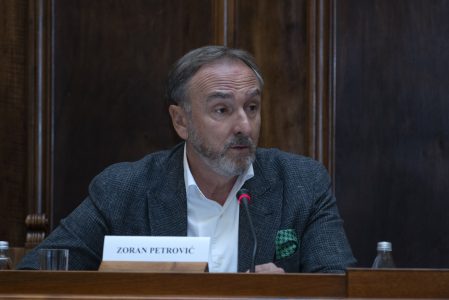
Mr Petrović also talked about the differences between Serbia and EU countries, in which export had a significant share. As a good example of the economy’s state, he said that the share of corporate non-performing loans in the total number of loans in the banking sector is extremely low and stands at 2.9 percent. Hence, he rated this year as very good. As for the members of the American Chamber of Commerce in Serbia, 80 percent of them were not significantly affected by the pandemic, as shown by AmCham’s latest research. “The same number of our members said that they recorded an increase in revenues, profits and investments,” Mr Petrović said. He also calls optimism about the arrival of the vaccine and the good lessons learned in the previous year, the most important for the success of the American Chamber of Commerce’s members.
He pointed out that agriculture has been the worst hit in the past two years, due to droughts, and that he hopes that this economic branch will generate better results next year. Mr Petrović also explained that that was extremely important because agriculture’s share in Serbia’s GDP is between 6 and 7 percent.
Despite the foreign currency exchange rate being stable, inflation remains one of the biggest challenges.
“We have a good situation with the public debt. Last year, we saw the benefits of the fiscal consolidation that the Serbian government carried out between 2014 and 2017. This created space for interventions fiscal and even monetary policy. We will end this year with a public debt that is lower than in many of the EU Member States. It is also a good thing that the fiscal deficit is much lower than planned, and the projections for next year are even lower. Of course, there are many challenges, among which I have to single out inflation, despite the foreign currency exchange rate being stable. Unfortunately, the Central Bank does not influence at least two-thirds of the factors that affect inflation,” he added.
President of the Italian-Serbian Chamber of Commerce, Giorgio Marchegiani, said that Italian companies in Serbia remained strong and very sturdy. He also stated that Italian tourism has suffered a lot, but that as an export country, Italy has managed to recover. According to him, “Italian companies are tied to Italian producers and have managed come on top, regardless of the problems with logistics and transportation. Everyone has adjusted. As far as the Italian companies in Serbia go, they are large banks and insurance companies, which have managed to survive on both the Serbian and Italian markets. 
The role of Serbia, as a country that produces for the Far East, is very important. Serbia wasted no time – it built infrastructure, which is the best pass for future development. Serbia is a truly European country and an important partner to added-value industries,” Mr Marchegiani stated.
When asked about the efficiency of the Serbian government’s assistance to companies during the pandemic, he said that the government was very fast and effective and added:” I think the government reacted at the right time which resulted in high GDP growth in Serbia and helped our members, Italian companies. If we want a safe harbour, this is the place to be. This is one of the main aspects of the good cooperation between our two countries which can be seen in relevant data.”
Dragan Stokić, President of the French-Serbian Chamber of Commerce, began his speech by saying the following: “French companies also had to change the dynamics of their business, as well as to adapt, reduce their activities and monitor the situation. Fortunately, this year, we have increased demand, to which we are also adapting well. So, my general impression is positive. No significant reduction in companies’ capacity and layoffs which is important. We feel ready for the year 2022.”
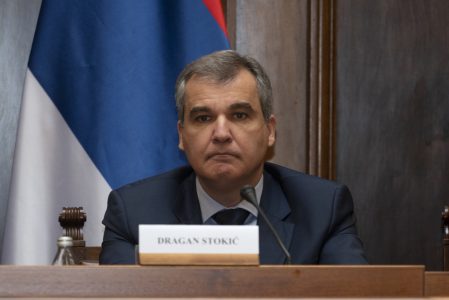
Mr Stokić singled out the transport sector, which was the worst affected after tourism, as the most important sectors for the French-Serbian Chamber. According to him, all projects that entail modernization and boosting the capacity of the Belgrade airport, which is under a concession by the French company, are going smoothly. Also, the Belgrade airport is undergoing the process of decarbonization.
The labour market disruption has affected all companies. There was an increase in the number of skilled and highly qualified workers, due to higher domestic demand, but primarily due to demand from Western European countries, which turned the countries in South-Eastern Europe. This is especially true in the IT sector, which has had a significant impact on growing labour costs.
He pointed out that facilitating youth employment will be one of the priorities of the French-Serbian Chamber of Commerce in 2022, to slow the brain drain and prevent highly qualified young people from leaving to work abroad.
It is important that there was no significant reduction in companies’ capacity and layoffs. We feel ready for the year 2022.
“This is a long-lasting process which is why we need to start it right away. That is why we support the formation of science and technology parks. Three have already been established – in Belgrade, Niš and Novi Sad – with the fourth one to be opened soon in Kragujevac. These science parks should be like incubators for start-ups and create opportunities for self-employment. We also support the activities of the Government’s IT and eAdministration Office, which has developed a set of innovative electronic services that further contribute to creating the impression of Serbia having a more favourable climate for business and economic expansion. Further digitalization of public and private companies should be encouraged too because digitalization essentially makes the management of company resources more efficient and fosters the implementation of more efficient business processes. The emphasis should certainly be on the Green Agenda,” Mr Stokić added.
Oliver Lepori, President of the Japan Business Alliance, said that there are currently about 60 Japanese companies operating in Serbia, in line with a specific model which entails the integration into the local community. He cites the cultural and social mobility of the workforce as the biggest challenges for Japanese companies.
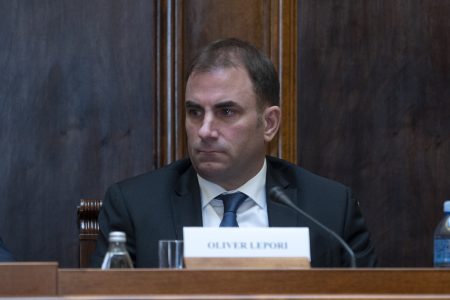
“Japanese investments were quite noticeable last year. Japanese companies need an extremely highly skilled workforce and that is the problem we are all facing. On the other hand, such Japanese companies often go unnoticed in the communities in which they operate, precisely because of this characteristic way of doing business and their integration into the community. The goal of Japanese business culture is to provide as much support as possible to the local community. We are talking about long-term relations and stable investments. Companies contribute not only with their direct investments, creating new jobs, increasing export and affecting the national GDP, but also by bringing with them a so-called quiet and qualitative change,” Mr Lepori explained.
Comparing the fall in GDP in 2020 and the growth in 2021, he concluded that Japanese companies managed to find their way around quickly, which is mostly because they are usually huge systems that have dozens of factories all over the world, on all continents.
“The situation has been mitigated by a large number of vaccinated people in Japan, so there are now less than 100 infected people per day in the country. In the first phase, this has also affected domestic companies, both importers and exporters,” said Mr Lepori.
The president of the Japanese Business Alliance also explained that Japanese factories in Serbia purify air and water, thanks to the support of the Japanese government. They are also involved in the digitalization process in Serbia. He also said that a challenge such as supply chain disruptions, which came to the fore during the pandemic, could be an opportunity for the Western Balkan companies, and that higher foreign investments are expected in the coming years. Next year marks the 140th anniversary of the establishment of diplomatic relations between Serbia and Japan, and it is expected that 2022 will be a historic year due to the growing needs and opportunities for doing business in Serbia.
Simon Savsek, an economist at the European Investment Bank, pointed out that more time will be needed for the economy to recover from the pandemic. He cited wrong estimates from the beginning of the pandemic that the virus will bypass Europe.
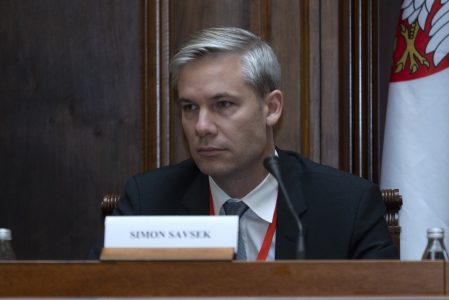
“There was a lot of help not only from the local authorities but also from the International Monetary Fund and other organizations. Also, the vaccination went much faster than we thought initially. The research we conducted shows that 90 percent of companies in the Western Balkans received some kind of salary subsidy, between 10 and 20 of them say they received loans, but close to 40 percent of companies closed temporarily, and 61 percent reported lower liquidity,” Mr Savsek adds.
“When it comes to obstacles, the informal sector was affected by problems. I would also like to mention political instability, high taxes and a poorly educated workforce which results from a high rate of structural employment. You can see read about that in the European Commission’s report on Serbia and other countries,” Mr Savsek explained.
When it comes to banks, he said out that they have digitalized and effectively implemented state measures, but also that small and medium-sized enterprises have encountered financial problems, which the European Investment Bank will continue to work on resolving.
Those companies that went digital before the pandemic, that invested more in employees, had higher productivity and better managerial functions fared the best.
In terms of the shortage of skilled workforce in the Western Balkans, Mr Savsek said that only a third of companies offered training to employees. However, he sees outdated infrastructure as one of the problems for Serbia’s business.
“I agree that the fiscal consolidation helped before the crisis, but Serbia now has lower GDP per capita. Recovery is taking place but certain tax buffers should be put in place. Those companies that went digital before the pandemic, that invested more in employees, had higher productivity and better managerial functions fared the best. From a macroeconomic perspective, the gap between ‘the losers’ and ‘the winners’ will be much wider and the question will arise who to support. All this needs to be considered,” he adds.
Dr David Landsman, President of the British-Serbian Chamber of Commerce, above all highlights optimism. He says that a lot has changed in recent years in both countries and that one of the consequences is that the business communities of both countries have fresh views on opportunities.
“Serbia is the largest country in the emerging region, and that certainly attracts a lot of attention. Just look at the map of Europe and ongoing infrastructure investments. Someone mentioned the problem of education but look at human capital and the progress of Serbian companies in Great Britain. That is what I keep saying to British companies. From a business point of view, we need to look at the bigger picture,” Dr Landsman said.
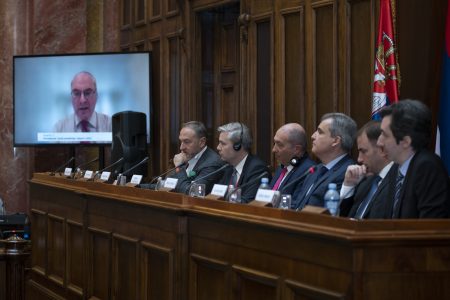
Although there is now an epidemic of a new strain, Dr Landsman says he is optimistic about next year. Commenting on Brexit, he says that the fact that Great Britain left the EU will not change and that a plan for their further relations is still being developed. Great Britain will have different regulations than the EU in some segments, such as retail and production, but will also maintain the European standards in many areas.
“Some of the Serbian members of our Chamber of Commerce are setting up companies for innovative technologies in the UK. That is something that we, as a chamber, are trying to advertise here in the UK. Both countries are changing and seeing each other in a different light. The United Kingdom will conclude more trade agreements with third-country countries in the coming years. We will focus on services, in which the UK is already quite successful. So, we are turning away from the EU and trading more with non-EU countries,” he added.
There are various opportunities for British and Serbian companies, Dr Landsman concluded, adding that the rules regarding workforce mobility have changed for the better which translates into better opportunities for Serbian companies in Britain. Britain has set aside 4 billion pounds for projects in Serbia, which, as he says, is a good incentive for private capital to invest.